Perpetually Dry Skin? You're Probably Forgetting This Underrated Step Post-Shower

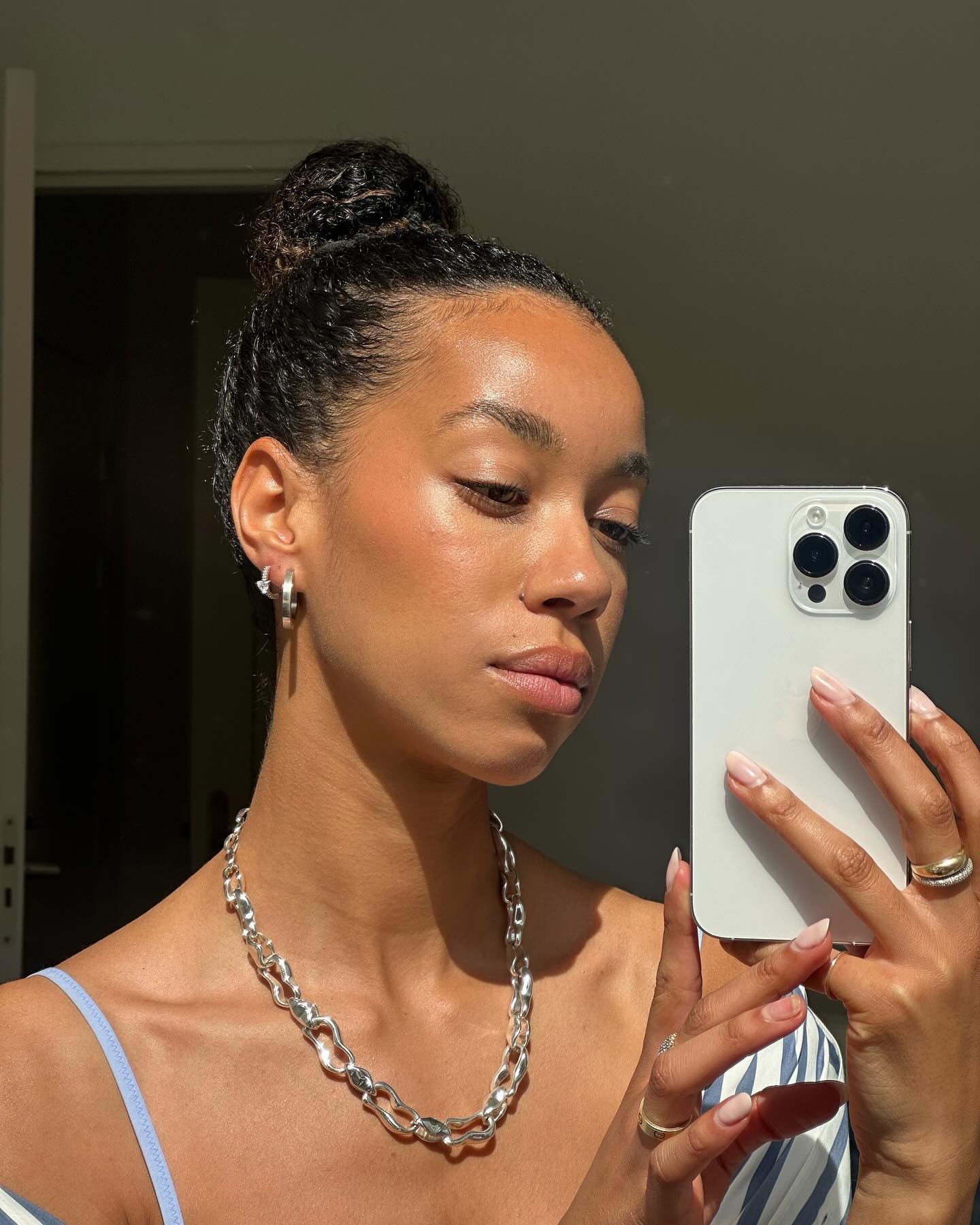
As someone who struggles with dry, cracked skin year-round, I have a multi-step bodycare routine to prevent itching and flakes—and I don't dare take a day off. Neglecting my post-shower regimen for even one night results in borderline reptilian skin in the a.m., so I always keep the essentials within arm's reach: body lotion, oil, and serum.
That last one may seem a bit extra, but trust me when I say that body serums (aka, lightweight, targeted formulas brimming with potent actives) are what actually move the needle when it comes to securing soft, supple, luminous skin. My own complexion dramatically improved when I finally incorporated one into my bodycare routine, and I've tested more formulas than I can count to discover the best of the best. You could say I'm a body-serum connoisseur at this point, and I will stop at nothing to convince everyone to hop aboard for their post-shower routine.
Ahead, discover which formulas earn precious real estate on my own bathroom shelf, plus expert-approved picks from board-certified dermatologist Sara Hogan, MD, FAAD. Trust me—your glowing skin will thank you!
The Best Body Serums, Listed
- Best Overall: Osea Hyaluronic Acid Body Serum
- Best for Crepey Skin: Clarins Renew-Plus Anti-Wrinkle & Anti-Aging Body Serum
- Best for Cellulite: Mutha Body Contour Serum
- Best With Retinol: Fig. 1 Retinol Renewal Body Serum
- Best for KP: Soft Services Smoothing Solution
- Best Splurge: Dr. Barbara Sturm Super Anti-Aging Body Serum
- Best for Dark Spots: Oui the People Cheat Sheet Overnight Resurfacing Body Serum
- Derm Recommended: Nécessaire The Body Vitamin C
- Best Scent: Tata Harper Resurfacing + Smoothing Body Serum
The Best Body Serums of 2024
Best Overall: Osea Hyaluronic Acid Body Serum
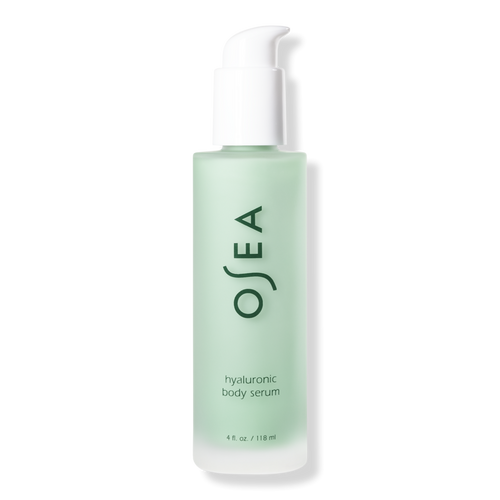
Pros: Fragrance-free, gentle enough to use daily, hydrates like no other
Cons: Strictly hydrating, if you're looking for exfoliating or retinol-infused formula
Key ingredients: Hyaluronic acid, niacinamide, peptides, aloe, algae
This is the body serum I personally use nightly. Hydration is its main gig, with five molecular weights of hyaluronic acid to drench each skin layer with much-needed moisture. It's been shown to boost hydration by 161% with 24 hours of nonstop moisture, and I can personally attest to that data point. My skin feels smoother and much suppler whenever I use it—and when I don't, the flakes and cracks quickly reappear.
Customer review: "Love this product. So moisturizing and not greasy! Highly recommend, no more crepey skin!"
Best for Crepey Skin: Clarins Renew-Plus Anti-Wrinkle & Anti-Aging Body Serum
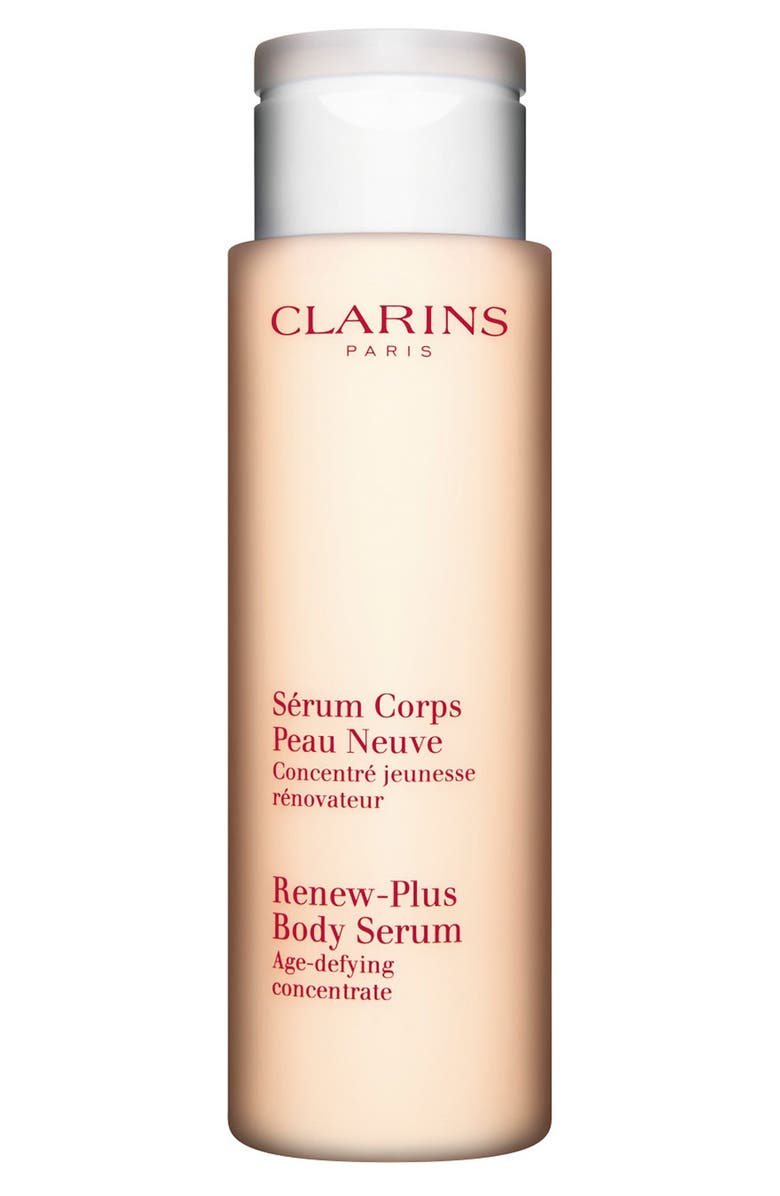
Pros: Gently buffs and brightens skin; great for thin, crepey skin
Cons: Contains fragrance, something to note if you have sensitive skin
Key ingredients: Chayote extract, water lily extract, hibiscus flower acids
Crepey skin (aka, thin, delicate skin that tends to appear with age) can be tricky to treat. Regular exfoliation can help regenerate skin cells, which can make skin appear stronger over time, but the skin is also much more sensitive, which makes sloughing off dead cells quite the challenge. This body serum, which gently buffs the skin with hibiscus flower acids, is the perfect middle ground. It's great for those looking for a soft nudge of exfoliation, and it piles on the moisture to ensure there's no irritation.
Customer review: "I definitely hesitated prior to splurging for a body serum. I use multiple layers of skin products on my face, mind you, but a body serum seemed a little over the top. Glad I decided to try this one, because my middle-aged skin, which was looking a bit thin/crepey and peppered with age spots from prior abuses, now seems firmer, softer, and more supple. I can't say that the brown age spots are improved, but I'm hoping for a preventative effect against forming new ones. I do let this absorb, then follow it up with the moisture rich body lotion."
Best for Cellulite: Mutha Body Contour Serum
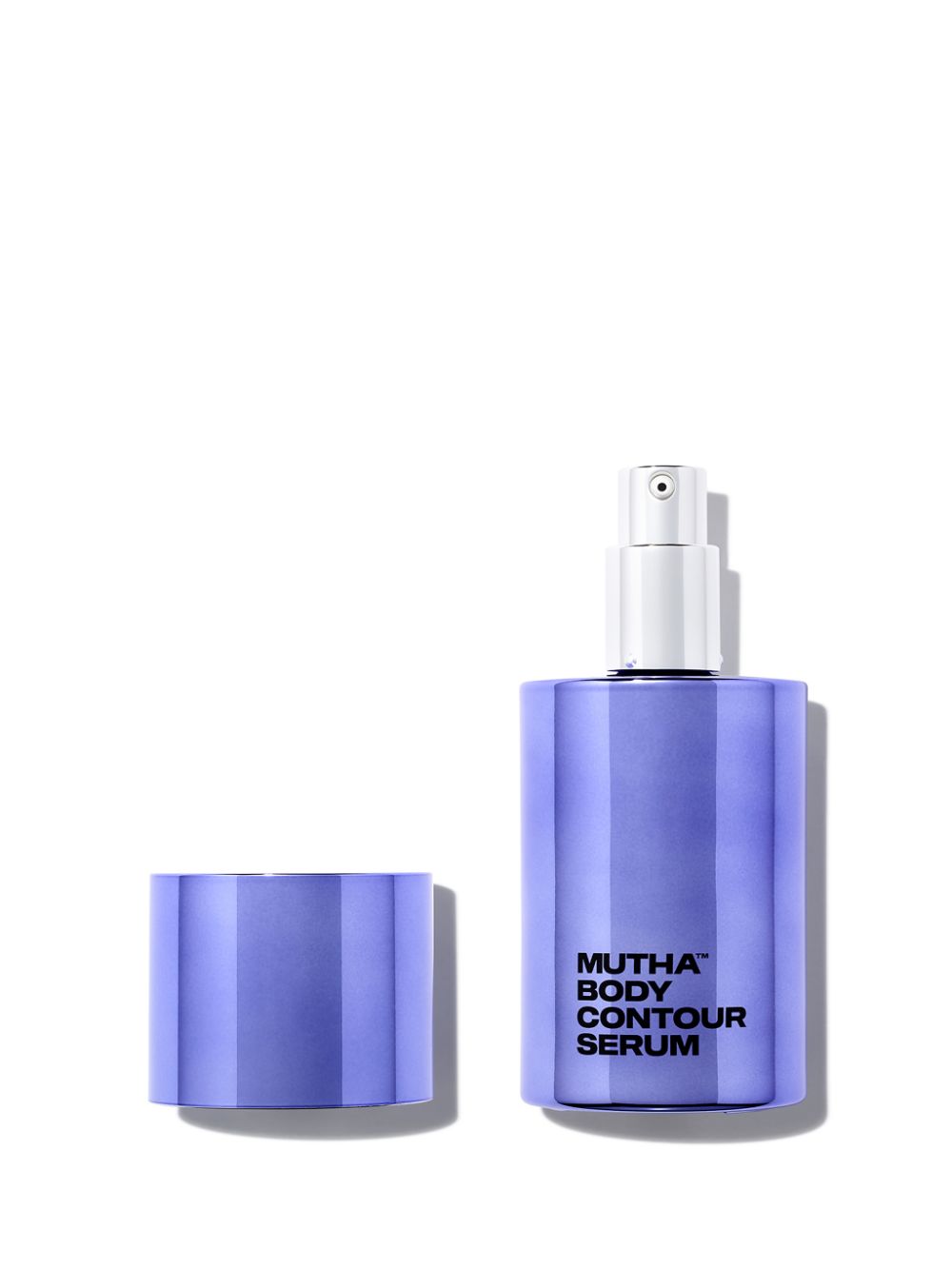
Pros: Contains 97% natural-origin ingredients, brightens, hydrates, and tightens the skin
Cons: Has a warm, tingly feeling upon application, if that bothers you
Key ingredients: M-Tight (organic mustard sprout extract and capsaicin), fruit acids, hyaluronic acid, squalane, coffee seed extract, baobab seed oil, and niacinamide
Let me just say that cellulite is incredibly common, and it can show up no matter your body type, weight, or age. If you are a living, breathing, human, you likely have cellulite, and we shouldn't stigmatize it! That being said, if the dimpled texture bothers you, some products can help temporarily reduce the appearance. No topical product can rid cellulite for good, but this serum contains circulation-stimulating ingredients—such as M-Tight, Mutha's signature complex that includes mustard sprout extract and capsaicin, coffee seed extract, and fruit acids—to offer a skin-tightening effect. In fact, 92% of participants reported tighter and firmer skin after using the serum, according to a consumer study conducted by the brand.
Customer review: "I love the Body Contour Serum, I’ve tried other tightening creams/serums in the past and nothing has worked like this!"
Best With Retinol: Fig. 1 Retinol Renewal Body Serum
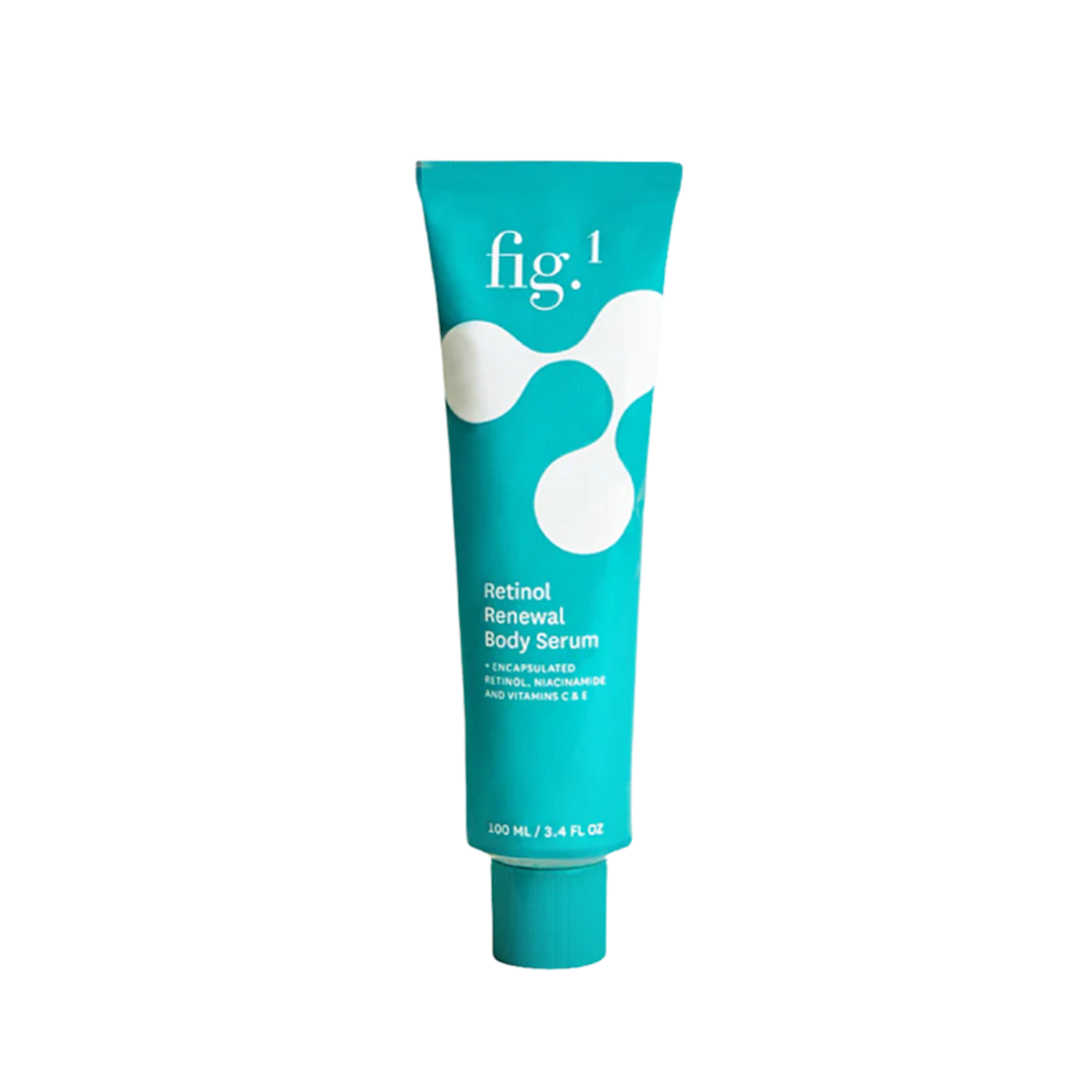
Pros: Hydrates and helps smooth fine lines, gentle enough for sensitive areas like the décolletage
Cons: I wish the packaging were a little more user-friendly (such as a pump), although pumps are not as sustainable
Key ingredients: Encapsulated retinol, vitamin C, vitamin E, niacinamide
I couldn't find a retinol body serum I loved until I tried this Fig. 1 option. It has a buttery texture, glides easily, and absorbs into the skin in seconds. It contains encapsulated retinol, which allows for a slow release of the ingredient to avoid irritation, as well as niacinamide, vitamin C, and vitamin E to deliver a healthy dose of brightness. Just be sure to pat your skin completely dry before applying, as retinol works best on a clean, dry canvas.
Customer review: "I am using this serum every other day before daily lotion in body areas with thinner skin, like [the] neck, decollete, knees and elbows, and I noticed thin wrinkly crepey skin started decreasing already."
Best for KP: Soft Services Smoothing Solution
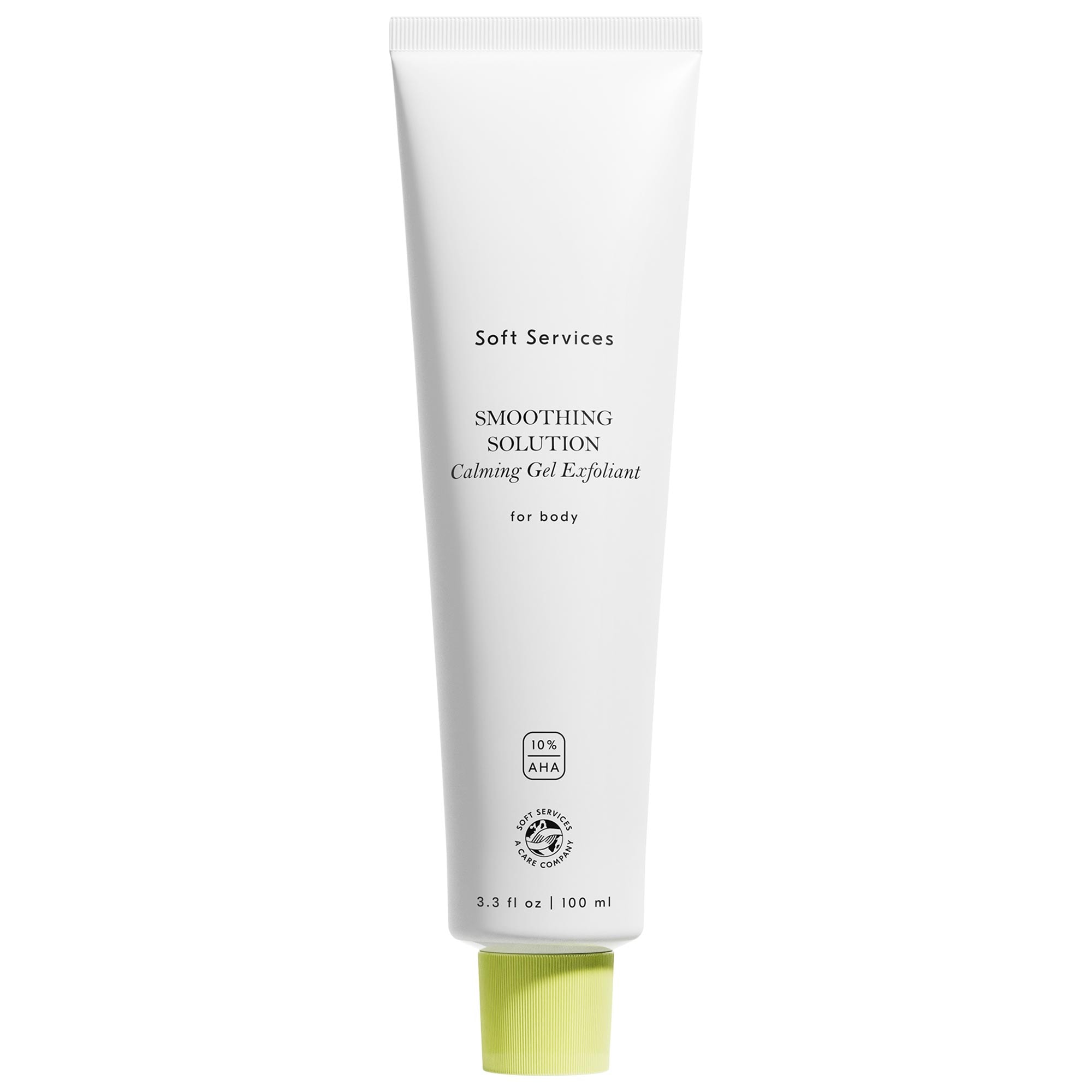
Pros: Fragrance-free, great for bumps (keratosis pilaris, acne, etc.) and fading discoloration
Cons: Gel texture can feel slimy/sticky
Key ingredients: Lactic acid, urea, Centella asiatica, hyaluronic acid, aloe
Soft Services launches hit after hit on the bodycare scene, and its Smoothing Solution is a tried-and-true winner. It's a universal crowd pleaser for keratosis pilaris (KP), ingrown hairs, discoloration, and generally rough, dry skin. Lactic acid and urea gently resurface and brighten, while Centella asiatica, hyaluronic acid, and aloe make sure the skin barrier stays well-moisturized and happy.
Customer review: "Please do yourself a favor and just buy this product. You will not regret it. I am very prone to ingrown hairs and razor burn, and I have tried everything to prevent it. This is the only product that keeps me from absolutely losing my mind. It also works wonders on my keratosis pilaris. Again, I have tried everything to alleviate my KP, and this is the only product I have ever found that works. I cannot recommend this enough."
Best Splurge: Dr. Barbara Sturm Super Anti-Aging Body Serum
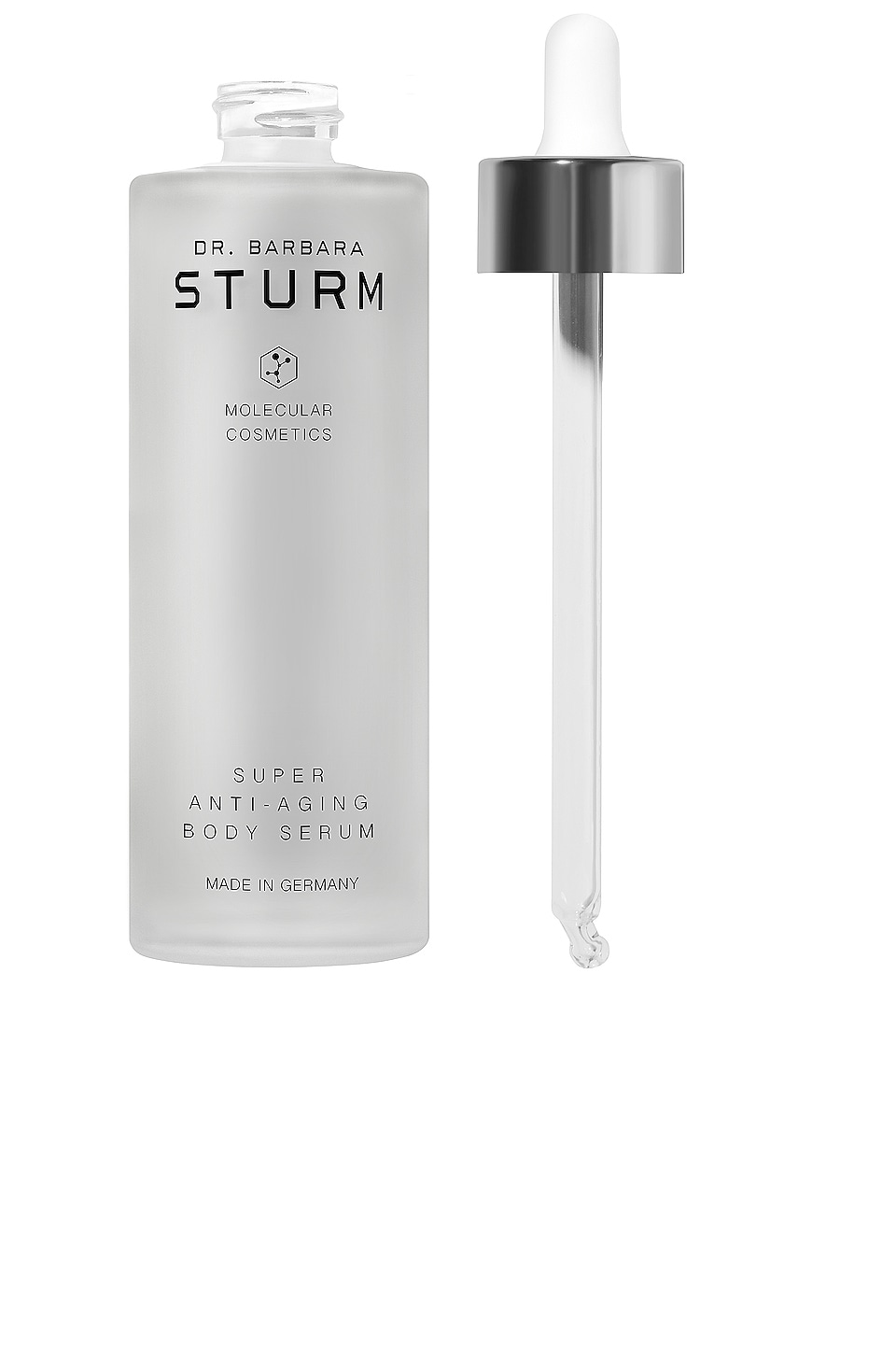
Pros: Super hydrating and plumping, gentle enough to use daily, great for sensitive skin
Cons: Has a very watery texture
Key ingredients: Hyaluronic acid, peptides, panthenol
I could wax poetic about Dr. Barbara Sturm's Hyaluronic Serum (it's pricey, but no other HA serum has given me the same effect!), and this formula is like its supersize bodycare version. My skin immediately drinks up the thin, hyaluronic acid–infused serum, so it's no wonder I practically flew through my first bottle. My one callout is the packaging—it's very chic with a pipette applicator, but because I wanted to practically bathe in the stuff, refilling the dropper multiple times became a little tedious.
Customer review: "I love the body serum so much! It really helped me with various skin problems and almost completely cured a really stubborn eczema I had for a very long time. My skin is really sensitive and troubled and this product is just what I needed. I've been using it since it came out and will keep using it."
Best for Dark Spots: Oui the People Cheat Sheet Overnight Resurfacing Body Serum
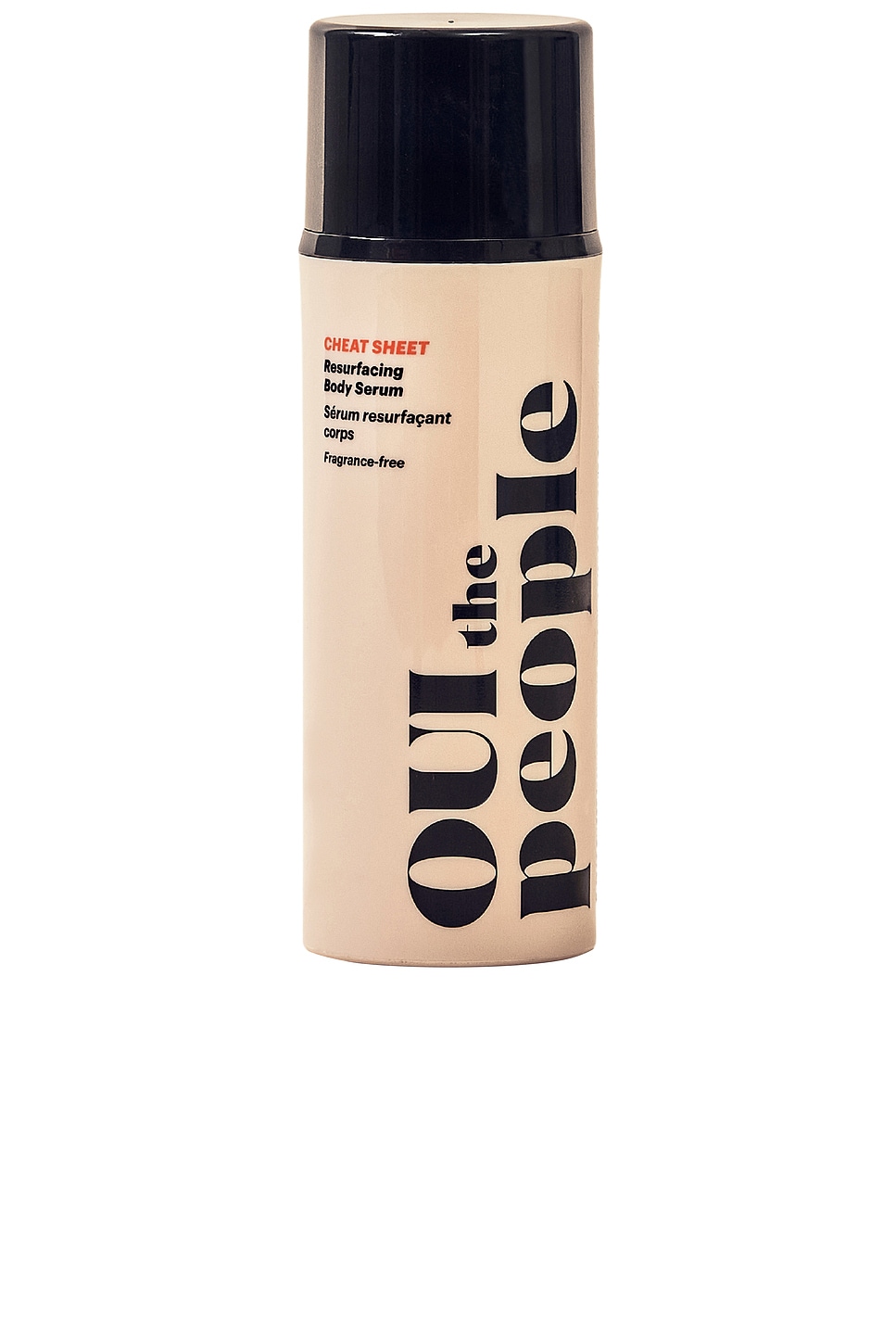
Pros: Great for KP, ingrowns, and discoloration; smells great
Cons: Dries down a bit sticky
Key ingredients: Glycolic acid, salicylic acid, lactic acid, PHAs, witch hazel
Oui the People has a robust selection of high-quality personal grooming products, such as razors, shave gels, and aftercare staples, like this exfoliating body serum. It's great for ingrown hairs and KP, but the blend of AHAs, BHAs, and PHAs works wonders to fade dark spots of any kind (sunspots, hyperpigmentation, etc.).
Customer review: "I am so glad to have stumbled upon this product. I’ve been using [it] for a week and have seen unprecedented results. Be sure to rub in until dry. I have blackheads and hyperpigmentation underarms and between my thighs. With consistent use the appearance of blackheads has decreased. My skin is much softer. I even tried Cheat Sheet on the heels of my feet and was amazed at how well they were exfoliated. I’ve used several mildly abrasive scrubs in the past, which left my shower a mess and didn’t work anywhere close to Cheat Sheet. This product is NECESSARY in my routine."
Derm Recommended: Nécessaire The Body Vitamin C
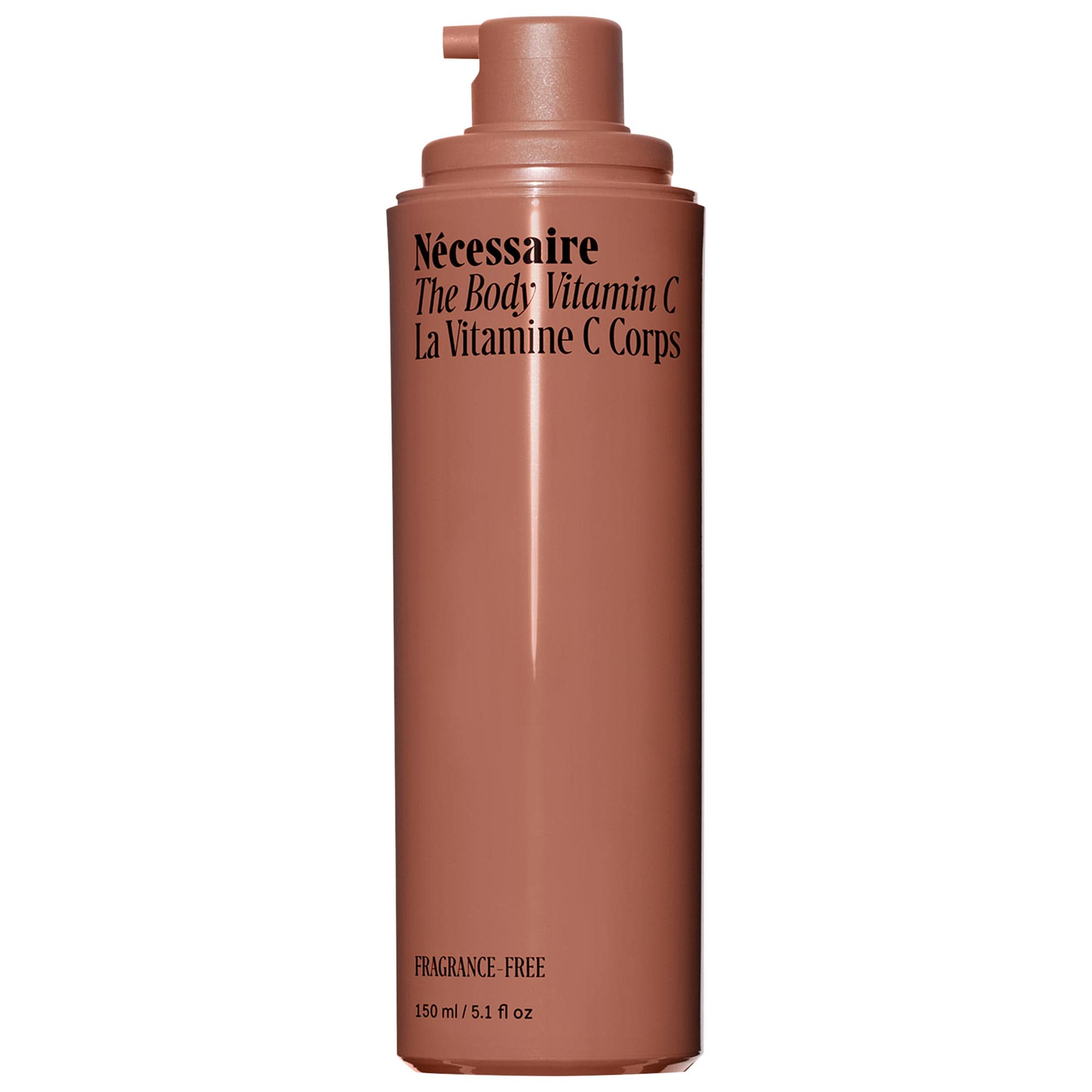
Pros: Great for skin brightening, fragrance-free
Cons: Not the best if you're sensitive to vitamin C
Key ingredients: Vitamin C, tranexamic acid, enzymes
I already adore Nécessaire's hyaluronic acid–infused body serum, but according to Hogan, the brand's vitamin C version is an absolute must-try. "This lightweight, fragrance-free serum can be used on most skin types," she says. "It contains tetrahexyldecyl ascorbate, a stable form of vitamin C, tranexamic acid, niacinamide and vitamin E, to brighten, even tone and moisturize." Imagine a vitamin C serum for your whole body!
Customer review: "I have fallen in love with this product! I tend to be dry, and also have hyperpigmentation from breakouts and bug bites on my body. This product is already showing a difference, and I’m so excited to see the major change with continued use!"
Best Scent: Tata Harper Resurfacing + Smoothing Body Serum
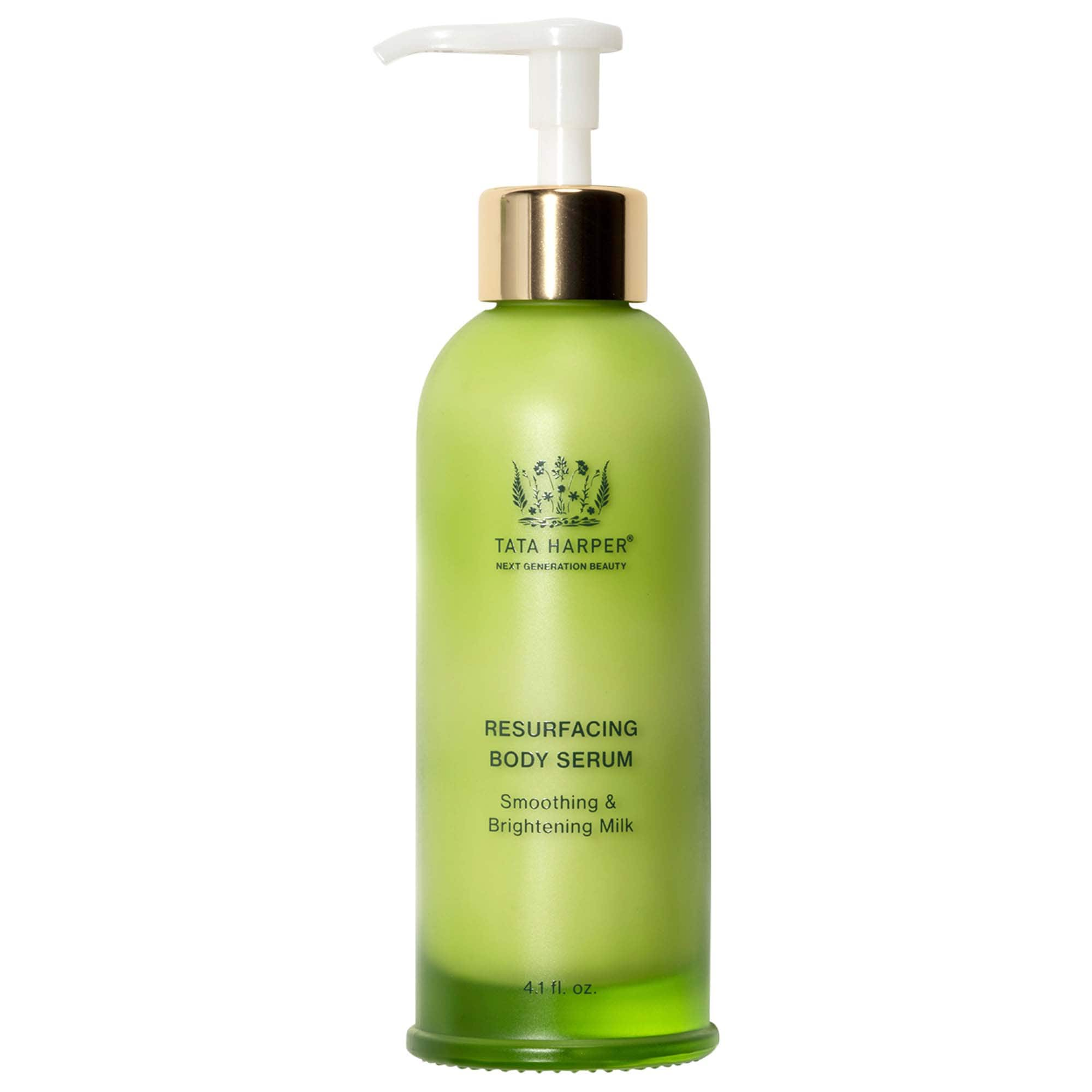
Pros: Gently buffs skin, great for skin brightening, naturally derived
Cons: Contains essential oils, if you're sensitive to natural fragrance
Key ingredients: Fruit AHAs, willow bark extract, kakadu plum extract, cacay oil
Tata Harper's natural formulas contain the most elevated fragrances from essential oils, so you can expect the brand's resurfacing serum to smell seriously divine. It calls upon plant-based heroes, such as willow bark extract (a natural alternative to salicylic acid) and cacay oil (a plant-based retinol alternative) to smooth and tighten skin over time. I will say the scent is quite earthy, which is something to note if you don't prefer mossy, natural fragrances, but I personally love the fresh aroma—plenty of reviewers do too!
Customer review: "I am so glad that I chose to try Tata Harper's Resurfacing Body Serum! Let's start with the packaging and the bottle, which is absolutely beautiful! I love the way it looks on my night stand. I have been applying it to my legs, thighs and arms to help with my aging skin. I love the light earthy and healthy scent of this product! I love this, and I will continue buying it! Must try!"
What to Look for in a Body Serum
The body serum you choose will depend on what exactly you're trying to treat. "Acne-prone skin may benefit from body serums that contain retinol or alpha- and beta-hydroxy acids, which encourage skin cell turnover and improve skin texture by removing dead skin cells," says Hogan. Those who wish to fade dark spots, on the other hand, might fare well with a formula infused with vitamin C or niacinamide. (Retinol can also be helpful for this purpose, Hogan adds.)
If dryness is your main gripe, you'll want to find a simply hydrating body serum to layer on before lotion, cream, or oil. "Individuals with sensitive or dry skin should look for body serums containing glycerin, lactic acid, hyaluronic acid, which attract moisture from the environment," Hogan explains.

FAQ
Are body serums worth it?
Are they downright necessary for your post-shower routine? Not exactly. But are they worth it? Oh yes, especially if you have a specific skin concern you'd like to address (acne, dark spots, crepey skin, dryness and flaking, etc.).
"Body serums contain high concentrations of ingredients that target specific skin concerns that we otherwise would pay less attention to because we tend to be more focused on our faces," echoes Hogan. "They can elevate a skincare routine, if there is a specific skin issue in mind."
Which body serum is best for glowing skin?
When it comes to skin brightening, Hogan is quick to call out Nécessaire's vitamin C–infused formula. "It contains tetrahexyldecyl ascorbate, a stable form of vitamin C, tranexamic acid, niacinamide, and vitamin E, to brighten, even tone, and moisturize," she says.
Which is better, body serum or body lotion?
There isn't one necessarily "better" than the other. Body serums are thinner, water-based solutions that tend to have a higher concentration of active ingredients (like retinol, AHAs, BHAs, etc), while lotions are generally thicker mixtures of oil and water. Some lotions do contain active ingredients, but their creamy base allows them to lock in moisture at the same time. "Creams require more rubbing than lotion into the skin, but once absorbed, create a barrier against moisture loss," adds Hogan. Body serums alone might not be enough to fend off transepidermal water loss (aka, when water literally evaporates from your skin).
Essentially, body serums are "better" for those who have specific skin concerns they'd like to treat; however, lotions are generally "better" at locking in moisture, which you should always prioritize post-shower.
What is the difference between body oil and body serum?
"Serums are water-based liquids designed to quickly absorb into the skin and deliver high concentrations of ingredients that target specific skin concerns," explains Hogan. "Oils are, well, oil-based, and are designed to seal in moisture in the skin."
A body oil can feature targeted actives, but body serums typically have higher concentrations of those players, since they're really meant to be a treatment step in your bodycare routine. Body oils, on the other hand, are meant to seal in moisture (similar to lotions); you can layer them over body serums to lock all those nourishing actives into the skin.
How to Apply a Body Serum
"Body serums should be applied after cleansing and before moisturizing," says Hogan. After lathering on your serum of choice, follow up with a body lotion, cream, or oil to lock in moisture. That said, "It is a good idea to consider the ingredients in both body serums and lotions or creams," Hogan adds. "Certain ingredients, if present in both a body serum and a moisturizer, may cause redness or irritation if layered."
As for how often to apply your body serum, it depends on the formula's active ingredients. "For example, body serums that contain retinol or alpha- and beta-hydroxy acids can cause irritation if applied nightly. Body serums containing hyaluronic acid, in contrast, can typically be applied nightly," Hogan explains. If you have an exfoliating or retinol-infused body serum, I'd start slow (like once or twice a week) and assess how your skin tolerates the increase.

Jamie Schneider is Who What Wear’s senior beauty editor based in New York City. With over seven years in the industry, she specializes in trend forecasting, covering everything from innovative fragrance launches to need-to-know makeup tutorials to celebrity profiles. She graduated from the University of Michigan with a B.A. in Organizational Studies and English before moving to NYC, and her work has appeared in MindBodyGreen, Coveteur, and more. When she’s not writing or testing the latest beauty finds, Jamie loves scouting vintage boutiques and reading thrillers, and she’s always down for a park picnic in Brooklyn.
-
 If I Could Only Use 15 Beauty Products, I'd Choose These
If I Could Only Use 15 Beauty Products, I'd Choose TheseMy essentials for glowing skin.
By Sasha Mironer
-
 All Your Favorite Celebs Book This Lymphatic Drainage Expert Before Events—I Scored Her At-Home Tips
All Your Favorite Celebs Book This Lymphatic Drainage Expert Before Events—I Scored Her At-Home TipsGenius de-puffing tricks ahead.
By Jamie Schneider
-
 Dry Skin and Damaged Hair? Hard Water Could Be the Culprit—Here's What to Do About It
Dry Skin and Damaged Hair? Hard Water Could Be the Culprit—Here's What to Do About ItTwo dermatologists and a trichologist agree.
By Kaitlyn McLintock
-
 Derms Say This Is the Ultimate "Glass Skin" Ingredient, and You've Probably Never Heard of It
Derms Say This Is the Ultimate "Glass Skin" Ingredient, and You've Probably Never Heard of ItHere's the 411.
By Kaitlyn McLintock
-
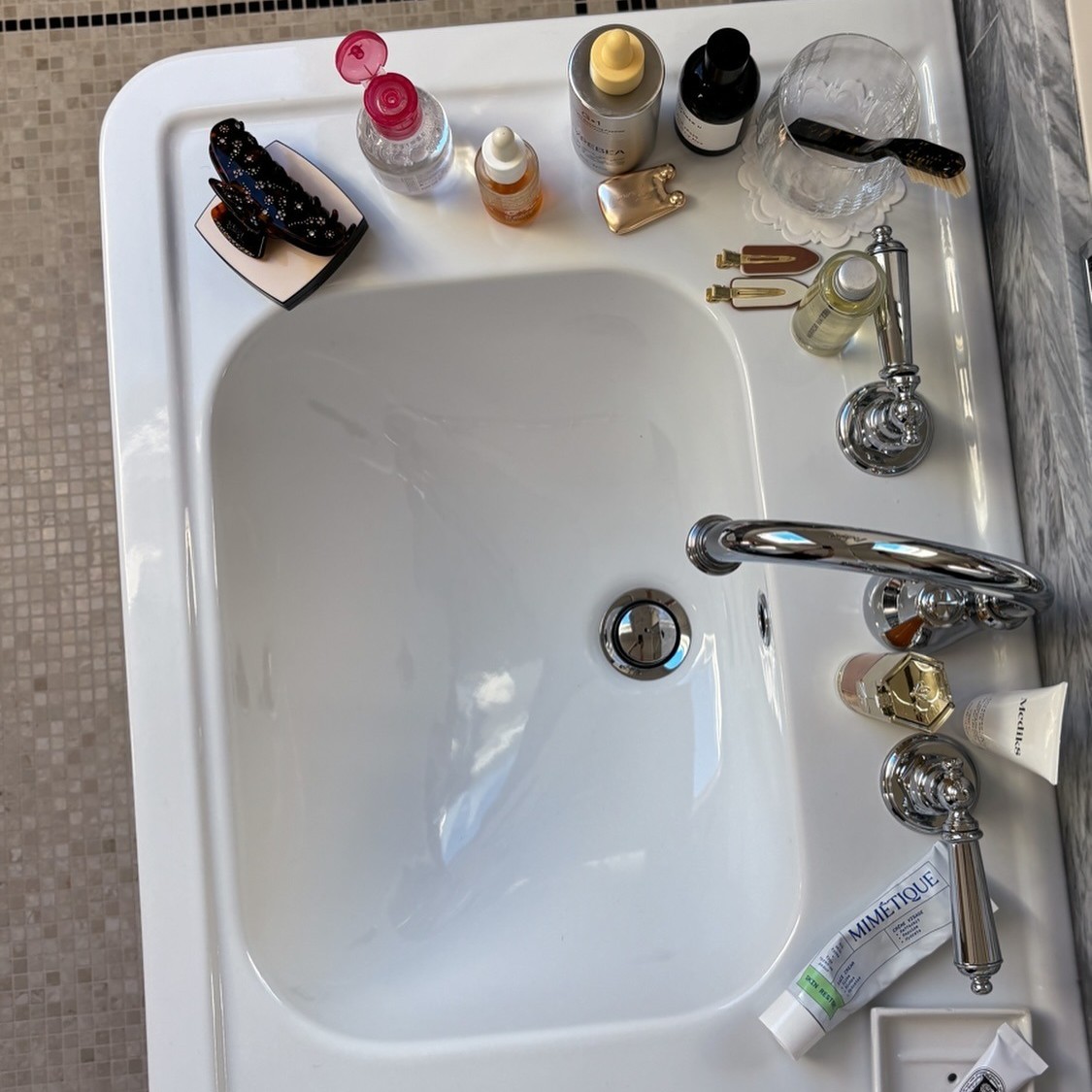 Derms and Beauty Editors (Hi, It's Me) Swear By This Straight-From-Nature Skin Hero That's DIY Mask–Approved
Derms and Beauty Editors (Hi, It's Me) Swear By This Straight-From-Nature Skin Hero That's DIY Mask–ApprovedThis is your sign to start slathering it on.
By Jamie Schneider
-
 Salma Hayek Pinault's Key to Youthful Skin? Moisturizer Sandwiches and This "Turkey Neck" Treatment
Salma Hayek Pinault's Key to Youthful Skin? Moisturizer Sandwiches and This "Turkey Neck" TreatmentNo retinol, no peels, and absolutely no injectables.
By Jamie Schneider
-
 My Sister and I Have Opposite Skin Types, But These Products *Magically* Work for Both of Us
My Sister and I Have Opposite Skin Types, But These Products *Magically* Work for Both of UsThese are our "unicorn" products.
By Kaitlyn McLintock
-
 Hailey Bieber Says She "Couldn't Live Without" This $12 French Pharmacy Cream
Hailey Bieber Says She "Couldn't Live Without" This $12 French Pharmacy CreamThat's it—I'm buying three.
By Kaitlyn McLintock

